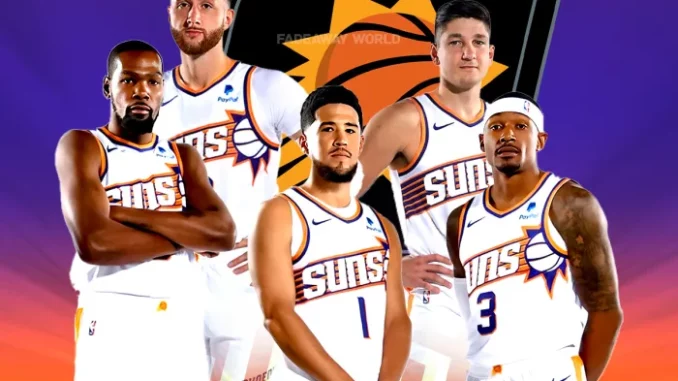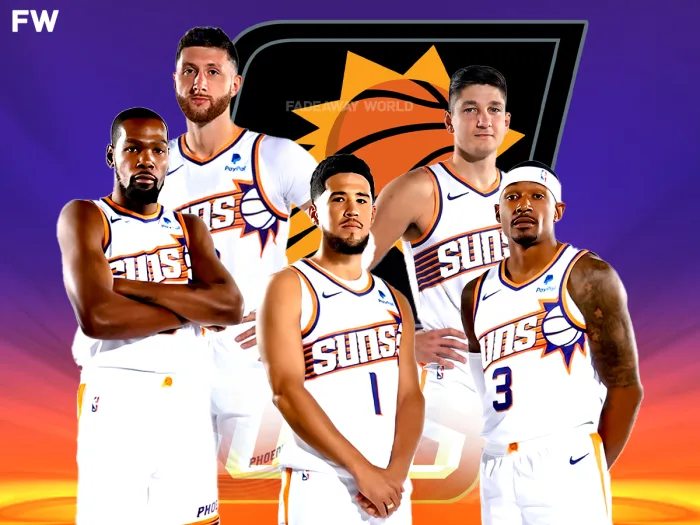
The Suns need to win an NBA championship or risk falling into obscurity in the near future.
The Phoenix Suns have a ton of pressure on them to perform in the 2024 Playoffs because their superstar core of Kevin Durant, Devin Booker, and Bradley Beal are expected to be good enough to win it all. However, failure to win an NBA championship this season could raise major question marks and quite frankly, their future looks very dark considering the entire makeup of their team (third-highest payroll in 2023-24 at $193,728,660) and the outlook of the 2024-25 season.
As Kevin Durant approaches his 36th birthday next season, there’s no denying the undeniable truth: time waits for no athlete, not even one of his caliber. While Durant is still among the top 10 talents in the world, his prime years are undeniably waning. His last championship glory came in 2018 with the Golden State Warriors, and his last MVP award dates back to 2014. As Durant edges closer to the twilight of his career, questions about his longevity and durability become unavoidable.
Adding another layer of complexity to this narrative is Durant’s hefty contract. He is set to earn a staggering $51,179,020 and $54,708,608 over the next two seasons, respectively. By the time his contract expires, he will be over 37 years old—an age where most NBA players have either retired or significantly declined in performance. Such a financial commitment to an aging superstar can severely hamper a franchise’s flexibility in terms of roster development and acquisitions.
In the case of Bradley Beal, his whopping $171 million contract paints a complex picture that has become increasingly concerning for both the player and the Suns. Beal, once considered an All-Star caliber player, has shown signs of decline this season.
He has appeared in only 47 games, maintaining a scoring average of 17.4 points per game (PPG) and Player Efficiency Rating (PER) of 15.2 below his career averages of 21.8 PPG and a PER of 18.2. While these numbers might be acceptable for a third option on a team, they fall short of the impact and production expected from a player with Beal’s contract and reputation.
Compounding these concerns is Beal’s injury history and declining availability. He hasn’t played in at least 65 games since the 2018-19 season, with his game counts over the past five seasons being a worrying 57, 60, 40, 50, and this season’s 47. Financially, Beal’s contract is an albatross that could potentially handcuff the Wizards’ roster flexibility for the foreseeable future. He is set to make $50,203,930, $53,666,270, and $57,128,610 over the next three seasons, respectively.
Given his current trajectory, this hefty financial commitment to an aging and injury-prone player could severely limit the team’s ability to make necessary roster improvements and acquisitions. In other words, a shooting guard exiting his prime with a vast injury history making max money means Bradley Beal could be untradable.
The acquisition of Jusuf Nurkic by the Phoenix Suns appeared to be a solid move, poised to fill the void at the center position with his scoring and rebounding prowess. Averaging 11.2 points and 11.0 rebounds per game while shooting 51.1% from the field, Nurkic’s numbers are solid. However, as the season has unfolded, it has become increasingly clear that Nurkic’s impact on the Suns has been less than needed.
One of the glaring issues with Nurkic’s game is his lackluster defense, particularly his slow-footedness, which has failed to significantly bolster Phoenix’s 16th-ranked defense. In a league built on switching, Nurkic’s limitations as a defender have become a liability rather than an asset for the Suns.
He is set to earn $18,125,000 and $19,375,000 over the next two seasons, respectively. For a player whose impact has been questionable, these figures represent a substantial portion of the Suns’ salary cap, potentially limiting their flexibility to address other roster needs and improvements.
Adding to these concerns is Nurkic’s injury history, which is far from reassuring. He hasn’t played in at least 65 games since the 2018-19 season, raising doubts about his durability and long-term availability. If Nurkic fails to deliver in the playoffs and justify his expensive contract, the Suns could find themselves saddled with an expensive and unproductive asset that is difficult to trade.
Grayson Allen Could Look For A Long Term Contract That Suns Can’t Afford
For the Phoenix Suns, the hefty contracts of their Big Three—along with Jusuf Nurkic’s deal—have already stretched their salary cap to its limits. This precarious financial situation could potentially jeopardize their ability to retain key role players like Grayson Allen.
Allen has emerged as a vital piece for the Suns, providing much-needed floor-spacing and defensive tenacity. Averaging 13.4 points per game while shooting an impressive 46.9% from three-point range, Allen’s offensive efficiency has been a boon for Phoenix. Additionally, his hustle on defense and willingness to compete for loose balls make him a valuable two-way player.
As Allen approaches free agency at 28 years old and in his prime, he is poised to command a lucrative long-term contract on the open market as he is a free agent after this season. Given his consistent performance and the increasing demand for players with his skill set, Allen could easily demand a salary in the range of $15-$18 million per season. That means the Suns might lose Allen because he will absolutely earn more than the $8,925,000 he is earning this season.
Suns Don’t Have Many Young Players On Roster
The Phoenix Suns’ current roster composition reflects a win-now mentality, anchored by their Big Three of Kevin Durant, Bradley Beal, and Jusuf Nurkic—all of whom are either in their primes or nearing the end of their peak years. A closer look at the Suns’ roster reveals a glaring lack of youthful prospects.
David Roddy, acquired before the trade deadline, has seen limited action with just 15 appearances and an average of 3.9 minutes per game. His minimal impact suggests that he is far from being a cornerstone player for the Suns at this juncture. Nassir Little, with 41 games under his belt and averaging 10.9 minutes per game, has yet to establish himself as a significant contributor, averaging a modest 3.6 points per game.
Meanwhile, Bol Bol, despite his intriguing potential, has been relegated to a limited role, averaging just 11.4 minutes per game without making a notable impact reminiscent of his father’s legacy. The Suns’ heavy reliance on players in their primes or on the decline poses a significant risk for the franchise’s future with only three players under 25 years old who are playing important roles while Saben Lee and Udoka Azubuike are only on two-way deals.
Devin Booker, arguably the best shooting guard in the league alongside Donovan Mitchell, has been a cornerstone of the Phoenix Suns’ resurgence in recent years. However, the Suns’ playoff disappointments and their aging roster could potentially strain Booker’s patience and commitment to the franchise. At 28 years old, Booker is in the prime of his career, averaging an impressive 27.6 points per game and establishing himself as an elite scorer.
His individual brilliance has been a bright spot for the Suns, but his desire to compete for championships could be hindered by the team’s inability to advance deep into the playoffs. The Suns’ second-round exit last year at the hands of the Denver Nuggets was a bitter pill to swallow, and a similar premature exit this season could further frustrate Booker.
Playing alongside older or injury-prone stars like Kevin Durant, Bradley Beal, and Jusuf Nurkic might not align with Booker’s timeline and aspirations. The window for championship contention is often fleeting in the NBA, and Booker might not want to be patient for another chance to make a Finals appearance for the first time since 2020-21.
If Booker becomes unhappy with the Suns, it could create significant turmoil within the organization and jeopardize their championship aspirations. The shooting guard is the best long-term player on the team and arguably the face of the franchise, so this could be the final straw for a Suns foundation that could topple.
The Suns Future Look Dark
In assessing the Phoenix Suns’ future, several troubling signs point toward a very dark road ahead. The team’s financial commitments to aging stars like Kevin Durant, Bradley Beal, and Jusuf Nurkic present significant salary cap constraints, potentially making them untradable assets if their performance declines or injuries persist. There are growing concerns about the team’s leadership and direction because who is the leader on the roster? Can Frank Vogel manage to force this trait on his players? That is unlikely when looking at Kevin Durant or Devin Booker’s track record in this sense.
Devin Booker, the Suns’ star player, could end up becoming discontented with the team’s inability to make significant playoff strides and the makeup of the roster. A disenchanted star could destabilize team chemistry and morale, and that could turn ugly quickly. Compounding these issues is the Suns’ lack of control over their first-round draft picks until 2031, meaning management could find it difficult to re-tool their roster with promising young players.
Adding to their future trouble is the stiff competition within the Western Conference. Teams like the Denver Nuggets, Minnesota Timberwolves, Oklahoma City Thunder, and Los Angeles Clippers are emerging as formidable contenders with balanced rosters and promising futures. In this highly competitive landscape, the Suns could find themselves outmatched in the playoffs which makes winning a championship very unlikely. If they do not win it all, a situation with a salary cap tied to older players constitutes a very dark future.
Copyright © 2025
Leave a Reply